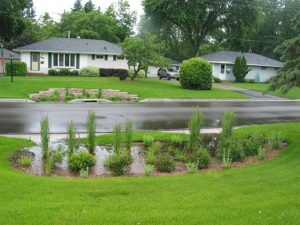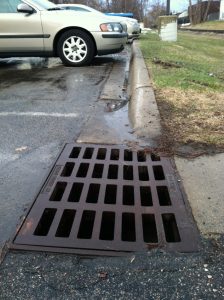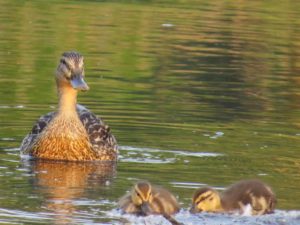Learn about practices that protect water bodies from pollution.
PROTECT OUR LAKES & CREEKS
Many of our urban waters have been impacted by polluted runoff. However, there are many practices—from raingardens to shoreline stabilization—that can protect and improve the health of our lakes and creeks.
Aquatic Invasive Species (AIS)
Aquatic Invasive Species (AIS) are non-native plants and animals that tend to spread rapidly and outcompete resident species. AIS cause damage to the environment or economic loss. They include Zebra mussels, Eurasian watermilfoil, and Curly-leaf pondweed. You can help slow the spread of AIS in the District’s water bodies. You can also read the District’s AIS Rapid Response Plan.
Stormwater Management
As rainwater travels over hard surfaces, the water picks up pollutants, like oil, fertilizer, and toxic metals. These, and other pollutants can damage local lakes, wetlands, and creeks. There are a number of stormwater management practices that reduce the impact from stormwater runoff.
Restore Your Shore
Shoreline and streambank plantings create natural buffer areas between lakes and creeks and upland areas.
Salt Reduction
Nine Mile Creek has too much chloride in it. The chloride comes from salt used in the winter on roads, parking lots, and sidewalks. Take steps to use less salt and protect the creek and local lakes.
WHY IT MATTERS
When stormwater travels over hard surfaces, like driveways and streets, it picks up pollution. This pollution includes things like grass clippings, leaves, pet waste, road salt, and fertilizer. The polluted runoff travels down stormdrains and directly into nearby waterbodies—untreated. Stormwater runoff is the number one source of pollution to waterbodies in urban areas. The choices we make impact how clean our lakes and creeks are.
Algae and Look alikes
Algae is a normal part of the plant life in lakes, like the ones in the Nine Mile Creek watershed. With all the pollution coming into lakes from stormwater runoff, waterbodies often have too many nutrients, like phosphorus and nitrogen. Too many nutrients can lead to unwanted algae growth. However, not all the green on the surface of a lake is algae! Learn more about algae, and algae lookalikes in the fact sheets below:
FLORA AND FAUNA

Learn about the plants and animals that live in the Nine Mile Creek Watershed District. Linnea Palmstrom created these incredible photo books of the Birds of Nine Mile Creek and the Flora of Nine Mile Creek for her Girl Scout Gold Award from 2012-2014.
